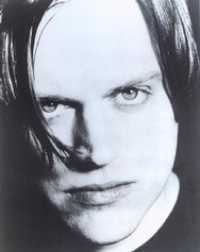By Nig Hodgkins
"Everybody has these stories - 'My parents had all the great Muddy Waters records'. Well, mine had the What's New Pussycat soundtrack and stuff like that..."
Matthew Sweet should by rights be a pop icon, rather than holding what's little more than cult status. He's been around for a decade, and, though not heavy, he has a brilliant pop sensibility, soaked in such youthful influences as Elvis Costello, John Lennon, Brian Wilson and Gram Parsons, and obsessed with the quest for melody-mesmerizing choruses, crisp solos, Byrd-like harmonies, and gorgeous ballads.
Sweet was something of a music prodigy and signed to CBS in 1985, who released his debut album, Inside, the following year. Unfortunately, his pristine playing and sweetly crafted melodies were compromised, and the songs swamped by trappings of the age like chiming synths and icily sequenced drums and keyboards. An array of producers, working on separate tracks in separate locations, exacerbated the music's lack of focus.
Inside taught Sweet the meaning of control, and this would be reflected in the rapid development of his own studio expertise, and in his urge to create a tight group of associates with whom he could form lasting allegiances. CBS had written him off, however, and he did not release an album again until Earth (1989). If the debut had shown the artist overdressed, this one stripped back the excesses to reveal the taut edginess and airy melancholia that would characterize his best work. It also introduced relationships that have continued to blossom, in particular the raw, intense soloing of Robert Quine (ex-Lou Reed) and the angular guitar lines of Richard Lloyd (ex-Television). They propelled the music into tight, knotty crescendos, only then to soften the sound and give space for moments of dreamy fragility.
Sweet's next effort, recorded in New York with a new label (BMG), was Girlfriend (1991), and it proved to be the critical breakthrough on both sides of the Atlantic. Never allowing a stellar supporting cast - including Lloyd, Quine and Lloyd Cole - to mask his distinctive delivery, Sweet combined plaintive multitracked harmonies and urgent, pulsing guitar to great effect. While several tracks struck a loner's pose, it was mainly an album of love songs, epitomized by the gentle poise and balance of the country-tinged "Your Sweet Voice".
It would have been easy to go for a similar follow-up, but instead Sweet offered the weird Altered Beast (1993). This pushed apart the twin extremes of hard-edged noise and languid balladry -beautifully aided by the piano work of the late Nicky Hopkins - leaving less middle ground for the uninitiated. The lyrics had taken a darker turn, with an unsettling dose of self-hate and psychosis bubbling below. It was at times brilliant, but its appeal was more readily apparent to the converted than to the curious, and it lost much of the commercial momentum Sweet had built up.
Perhaps this accounts for the approach of Sweet's 1995 follow-up, 100% Fun - so titled both in recognition of Kurt Cobain's suicide note ('I can't pretend I'm having 100% fun every night') and as a personal reminder to lighten up. Blue Sky On Mars (Zoo Entertainment, 1997) shows him taking his own advice - having headed for Los Angeles from his cold Nebraska base seems to have worked. Easily his happiest recording and a direct exercise in clean, guitar dynamics, it should have provided Sweet with the sales his talent deserves. However, commercial success continued to elude him, for reasons that are hard to fathom. Certainly he writes songs rather than singles, and his fear of flying has limited his touring, but these should not be hindrances to a talent of this sort.
Sweet released a mini album entitled Son of Altered Beast in 1994 in North America only. It has subsequently become a much sought after import. Mainly comprised of live material it features incendiary guitar work by Richard Lloyd and comes highly recommended.
Sweet has been embraced as something of an icon by the new Power Pop movement as evidenced by the style of new releases by groups such as Fountains of Wayne and Silver Sun. Suddenly it is hip to boast of owning the first three Cheap Trick albums, rare Raspberries singles and old Todd Rundgren albums. (Note from Style Editor: None of those things are hip round my way). This sudden championing of American-styled Power Pop (big guitars, glistening hooks, crunching melodies, bold, multi layered harmonising) should result in increased exposure for Sweet who, commercially at least, has struggled to step out of Girlfriend's shadow.
It's disappointing to report therefore that Blue Sky on Mars (Zoo) fails to re-ignite Sweet's career. Jettisoning Quine and Lloyd in favour of a more straightforward, self played sound, the album suffers primarily from a lack of ambition. Melodies are less distinctive than usual and one or two tracks have a "Sweet by numbers " feel that prevents the album from truly connecting. Sweet remains an in-demand influence, guesting recently on the Jayhawks' startling "Sound of Lies" album and featuring in Mike Myers backing band over the closing credits of the movie, Austin Powers! Perhaps he needs to reinvigorate his own output with a similar sense of risk taking.
Girlfriend (1991; Zoo/BMG). The ghost of Gram Parsons hovers over the ballads, and Alex Chilton appears to offer his voice on the brash choruses, but Girlfriend is undeniably Matthew Sweet's creation, and should have sold millions.
100% Fun (1995; Zoo/BMG). Less personal than its predecessor, 100% Fun is Sweet's most direct appeal to the mainstream. Notwithstanding this broader appeal, the album retains the peculiar charms that make his work so beguiling.
Top
